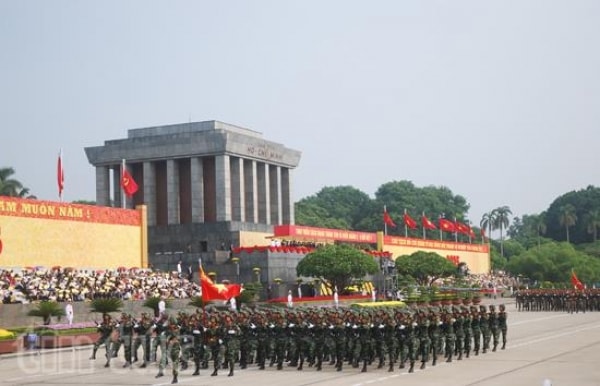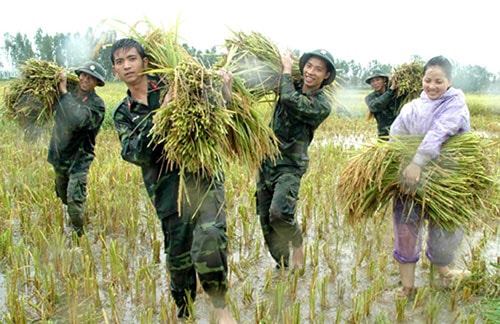(LLCT) - More than 2,500 years ago, the State of Van Lang of the Vietnamese was born, creating the awareness and sense of the homeland and nation and inspiring patriotism. Although patriotism is a universal value, it has its own peculiarities in Vietnam due to the country’s particular circumstances.

1.The People’s Army of Vietnam where the characters of the nation and the people meet and where the revolutionary nature of the working class is embodied
Due to the natural and historical conditions of the country, the sense of community among Vietnamese took shape very early. Ancient inhabitants in the country would have to unite together in order to survive and thrive. They would have to find every way to cope with extreme weather. Given such natural conditions, the most important factor behind the establishment of a state was water management and irrigation work. Dykes were built in order to serve production purposes rather than dividing societies like in the case of many other countries(1).
In addition to meeting demands for overcoming natural disasters and supplying water for agriculture, people would have to fight for their territories and lives. More than 2,500 years ago, the State of Van Lang of the Vietnamese was born, creating the awareness and sense of the homeland and nation and inspiring patriotism. Although patriotism is a universal value, it has its own peculiarities in Vietnam due to the country’s particular circumstances. The ancient Vietnamese society gave rise to the basic house - village - state structure. Everyone, regardless of their social class and age, would feel attached to their family, race, community and homeland and develop a sense of the territory, territorial integrity, history, culture, independence and sovereignty of the nation. This is the most regular, most typical characteristic of patriotism and also the origin and norm of the sense of community among each individual and the entire society.
During the Dai Viet era, which included the Ly - Tran to Late Le dynasties, the society, military and defence were organized in such a way they created miracles. The State would implement the policy of keeping soldiers stationed in rural areas. These soldiers would take turns to grow crops, train and protect the country. They had a close relation with people. However, before the Communist Party of Vietnam was born, the armed forces were organized and led by the feudalist class, so they were of a feudalist character. When they were born during peasants’ uprisings against ruling feudalists or invaders, they still remained reliant on feudalist ideology although they were more progressive. When the country was faced with the danger of foreign invasion, the interests of the ruling class and the burning desires of the masses to save the country met each other and created an enormous strength defeating foreign invaders. The glorious victories of the ancestors in the times of Ly, Tran and Le and Quang Trung - Nguyen Hue are typical examples. However, there was always a conflict of interest between the feudalist State’s armed forces and the masses. Sometimes, there were conflicts in policies of fighting foreign invasion, which resulted in limited victories and, in many cases, the armed forces failed to complete their missions. That was what happened to the Thuc An Duong Vuong, Ho Quy Ly and Nguyen dynasties.
On 22 December 1944, according to a Directive of Ho Chi Minh, the Vietnam Liberation and Propagation Army was founded. The Directive pointed out that this was to be the regular, first, leading army, the start of the liberation army and was tasked with helping local armed forces and coordinating with them in operations(2). On 15 May 1945, Vo Nguyen Giap announced the unification of revolutionary armed forces of the country into the Vietnam Liberation Army. After that, it was renamed as National Protection Group, National Protection Army, Vietnam National Army and the People’s Army of Vietnam as it is today.
Thus, the People’s Army of Vietnam was born during the country’s revolutions and originated from people. It met historical demands and, together with people, waged the general uprising and gained independence and freedom for the entire nation in August 1945.
Fully aware of the tradition “taking people as the roots” and Marxist - Leninist principles of the strength and historical role of the masses, Ho Chi Minh and the Party, while building the revolutionary armed forces, always emphasized that people were the origin of the strength of the army. They constantly educated or trained the army in the nature of the working class. The nature of the working class, people’s character, and national character were merged into one and formed the revolutionary nature of the army(3). Such nature has increased the scientific nature and fighting spirit of the army and has helped to diversity, deepen and harmonize the fine humanitarian traditions of the national safeguarding culture and Vietnamese culture. Ho Chi Minh drew up guidelines for instilling the revolutionary nature in people’s armed forces and army. He asked them to be “loyal to the country and the Party and obedient to the people”. Such is a noble mission of each and every soldier of the armed forces of the country. In the past, loyalty to the king and the country and respect for their parents were among major Vietnamese moral standards. Now, Ho Chi Minh raised these standards to a new height for the army. Loyalty to the king now became loyalty to the country. Respect for parents now included that for the people. The army was now supposed to sacrifice itself for the people and the country.
2. The army sacrificing itself for the people - a revolutionary virtue that took shape in a most natural way
The People’s Army of Vietnam was founded, educated and trained by the Communist Party of Vietnam and President Ho Chi Minh, in which the army takes pride. National character, people’s character, and the nature of the working class all find expression in the army and determine its revolutionary virtues. One of the extremely noble, moral and humanitarian virtues to which the staff and soldiers of the army are committed is that they are willing to sacrifice themselves for the people.

For the benefit of people, the army forgets itself. This is because the Party and Ho Chi Minh regularly educated it in fighting objectives and revolutionary ideals and morality and because each staff and soldier of the army constantly trained themselves in that respect and followed these teachings. The 34 first members of the Vietnam Liberation and Propagation Army, the country’s first regular army, in Tran Hung Dao forest, solemnly swore under the national flag to “sacrifice anything for the country and make Vietnam a democratic, independent and free country on the same level as democratic countries in the world”(4).
In 1964, on the 20th anniversary of the establishment of the People’s Army of Vietnam, Ho Chi Minh reminded the army to “stay loyal to the Party, grateful to the people and willing to fight and sacrifice for the independence and freedom of the country and for socialism. Any task must be carried out, any difficulty overcome and any enemy defeated”(5). Ho Chi Minh-era soldiers would not only join hands with people to protect national independence, unity and territorial integrity but also build a new society where people were liberated, took charge of their country and make the country wealthy, powerful, democratic, equitable and civilized, according to Ho Chi Minh’s wishes and will. The Party and Ho Chi Minh has instilled noble fighting objectives and ideals into soldiers.
The Army devotes itself for the people because from its inception, which was laden with numerous difficulties, to when it became a powerful force defeating many large imperialists, it would always receive support and cover from the people.
When it was first established, the People’s Army of Vietnam “lacked everything, from food to weapons to clothes to medicine.” Thanks to public support, it “grew from a group of dozens of men to a group of hundreds of people. Lots of young men signed up to join the group. People in the Northern mountains did everything they could to help the group. Some would sell their buffaloes or farmland. People in other places also sent in help... Gradually, the group became increasingly crowded and stronger”(6). While educating the Army to show respect for, and gratitude to the people, President Ho Chi Minh helped people to get a better understanding of the Army, which was willing to sacrifice itself to “kill enemies, save the country and protect the people.” He said, “As may already know, soldiers also have parents, siblings and other family members. But they have left their own families to go to the front to serve the greater family including yourselves. Therefore, you should be grateful to them and love them”(7).
Born in a time when the country was invaded and when the Party and President Ho Chi Minh were staging the revolution to gain independence and freedom for the country, the army inherited the fine values of Vietnamese people and culture and elevated them to a new height. They fought for the independence and freedom for the country and socialism. People called them Uncle Ho’s soldiers.
“Being loyal to the country and the Party and grateful to the people are the most precious, most fundamental qualities of “Uncle Ho’s soldiers” and form the roots of their revolutionary careers”(8).
The Party and President Ho Chi Minh would pay special attention to gratitude while they provided education and training for soldiers. “Being grateful to the people also means showing their gratitude to those who gave birth to them and brought them up. The most meaningful gratitude is sacrificing for the cause of national liberation”(9).
Sacrificing itself for the people - a core moral standard of the staff and soldiers of the Vietnam People’s Army - will be kept, enriched and promoted so that its value will shine even brighter.
Major General Trinh Vuong Hong
Institute of the Military History of Vietnam